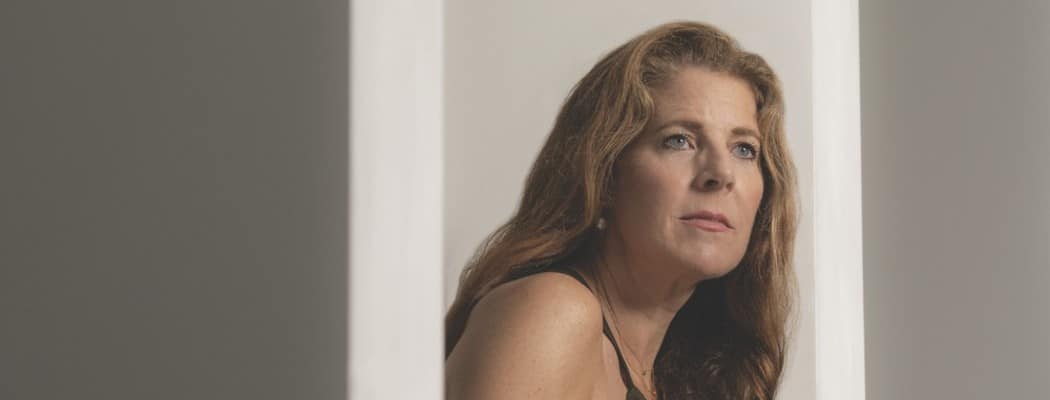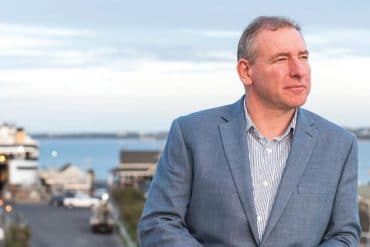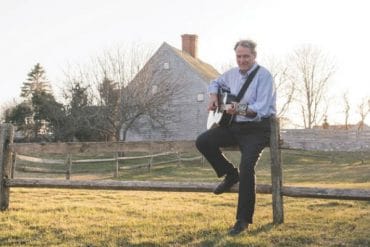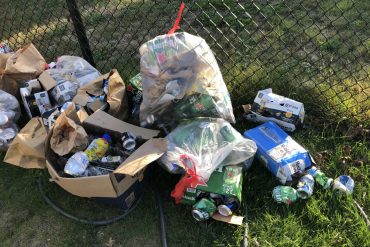A Nantucket summer resident’s experience on September 11th.
Lisa Britton Parker was actually looking forward to jury duty the morning of September 11, 2001. A producer for NBC, Parker had just wrapped a grueling eight-month project with Tom Brokaw that had finally aired two nights earlier on September 9. After months of working endless hours, she was now content to just sit in the courthouse in Lower Manhattan with a new book and a bagel and wait for her name to be called for jury duty. Gazing out the window of her cab as it was pulling up to the courthouse, something caught her eye. “What was that?” she asked the driver. His answer was unforgettable: “A plane.”
 As smoke billowed from the North Tower of the World Trade Center, Parker hustled over to a pay phone and called her boss at NBC. “I think something has happened at the World Trade Center,” she said. “Send a camera crew and I’ll meet them there.” Parker began walking toward the towers where people were exiting. With her reporter’s notebook in hand, she started speaking to those on the scene. There was a lot of confusion on the ground. Some thought it had been a news helicopter that had struck the building, or maybe a small prop plane. Suddenly a terrible sound filled the air. Parker looked up. “Oh my god, is that a plane?” she gasped. Before she could process the sight, the second airliner smashed into the South Tower.
As smoke billowed from the North Tower of the World Trade Center, Parker hustled over to a pay phone and called her boss at NBC. “I think something has happened at the World Trade Center,” she said. “Send a camera crew and I’ll meet them there.” Parker began walking toward the towers where people were exiting. With her reporter’s notebook in hand, she started speaking to those on the scene. There was a lot of confusion on the ground. Some thought it had been a news helicopter that had struck the building, or maybe a small prop plane. Suddenly a terrible sound filled the air. Parker looked up. “Oh my god, is that a plane?” she gasped. Before she could process the sight, the second airliner smashed into the South Tower.
As a multi-award-winning producer of Dateline NBC, Parker was used to putting herself into dangerous situations for the sake of a story, whether that was entering the hideout of a dangerous white supremist or reporting from inside of a crack den. A Boston University graduate who went on to receive a master’s degree in journalism from Stanford, Parker had a reporter’s instinct. Her most recent project with Dateline followed two groups of Sudanese men, so-called “Lost Boys,” who were arriving in the United States after spending a decade in a refugee camp in Kenya. The documentary would go on to haul in a slew of awards. Parker thought it was the project of her lifetime—but now, staring up at the Twin Towers pouring smoke into the pristine morning sky, she saw a wholly different story was emerging.
“The whole mood changed,” Parker recalled of being on the ground. “This was no accident.” While others fled from the building, Parker sprinted toward it. People were exiting the towers in all states of shock and terror, barefoot, bleeding, soaking wet from the fire sprinklers. One man seized Parker by the arm. “I just left them. I just left them,” he kept saying. The man had been on one of the upper floors of the South Tower, where he and his fellow employees had been told over the intercom to stay in their seats after the first plane hit. “But I didn’t listen to them,” he told her. “All my co-workers stayed.” And now they were all most likely dead.
 Nearing the base of the buildings, Parker came to a makeshift police barrier. “I’m a reporter,” she said. “I need to get in there to do my job.” The policeman looked around and then let her by, saying, “Just don’t tell anyone I let you in.”
Nearing the base of the buildings, Parker came to a makeshift police barrier. “I’m a reporter,” she said. “I need to get in there to do my job.” The policeman looked around and then let her by, saying, “Just don’t tell anyone I let you in.”
Passing through the barrier, there was no one to tell even if she wanted to. The streets were mostly empty. Reams of paper floated through the sky like tickertape. The scene would have been beautiful, she thought, if it wasn’t so eerie. She reached the edge of the World Trade Center. Throngs of firefighters were on the ground staring up at the buildings bleeding smoke and debris. The horrible reality began setting in. A cold sense of dread filled her gut. “What am I doing here?” she asked herself.
Parker turned to leave, but stopped and shot a quick glance back up at the buildings. “I saw the tower do a wave motion, this little bend,” she recalled. “And I just thought, ‘Oh my god, that thing is coming down.’” Parker started sprinting through the streets, but before she was more than a few blocks away, a wave of air lifted her up and threw her down hard onto the pavement. It had been the pressure of the South Tower falling. She looked back again to find a tsunami of ash and debris, a giant ball of black, descending upon her. Parker dragged herself to her feet and started limping away as fast as she could. She came to a divider in the street that she struggled to get over. Suddenly a man grabbed her by the arm and lifted her over it.
Parker and the stranger continued fleeing together. Spotting an older police officer in a state of panic, hastening back to his cruiser, Parker tried to get in the back seat of his car to take refuge from the debris, but the cop forced her back into the street, got into the driver’s seat and locked his doors. Meanwhile, the ball of black kept rolling toward them. “This thing was just coming, you could feel it, you could hear it, you could smell it,” she recalled. As the wave of debris consumed them, Parker and the man crouched down and put their arms around each other. The man yelled for her to pull her shirt over her face, but the material wouldn’t give. She took a big breath as the debris engulfed them.
“I thought for sure I was dead,” she recalled. “It was like someone took a really thick black felt blanket and just wrapped it around you as tight as possible and then shoved it down your throat.” They were in darkness for what felt like an eternity. Dust and debris penetrated every orifice. Staggering to their feet, Parker and the man stumbled down the street in a daze. “We looked like two gray ghosts,” she recalled. “I’m walking, holding the hand of a complete stranger.”
 They continued walking through Manhattan. New Yorkers were gathered on every street corner staring up at the unfamiliar sight of a lone tower piercing the sky. “I’m scared to let you go,” Parker said to the stranger as they prepared to part ways. The man had just started a new job and had been in one of the Twin Towers. “But we made it,” she said. “We’re alive…Thank God, we’re alive.” They shared a final embrace and then went their separate ways. Twenty seconds later, the second tower fell.
They continued walking through Manhattan. New Yorkers were gathered on every street corner staring up at the unfamiliar sight of a lone tower piercing the sky. “I’m scared to let you go,” Parker said to the stranger as they prepared to part ways. The man had just started a new job and had been in one of the Twin Towers. “But we made it,” she said. “We’re alive…Thank God, we’re alive.” They shared a final embrace and then went their separate ways. Twenty seconds later, the second tower fell.
Parker was now far enough away that the debris from the second tower wouldn’t reach her, but the sight of it falling still sent her into a panic. She ran up to those gathered in the street and pleaded for them to flee. “I was desperate to have them leave,” she recalled. A woman took her by the shoulders, looked her in the eyes, and said, “You’re having a panic attack.”
Hearing this snapped Parker back into reality. She continued walking toward 30 Rockefeller Plaza to rejoin her team at NBC, which had now set up a makeshift office across the street after a bomb threat was called in. On the way, she spotted a priest dressed in flowing robes with
a big cross around his neck, standing in front of the church with his hands raised to the heavens. Parker decided to enter the church. “It was packed to the gills,” she recalled. “All these people were praying and crying.” She took a seat at one of the pews and said a silent prayer.
Within twenty minutes of reaching NBC’s headquarters, before she even had time to get the dust and debris out of her hair, Parker was thrust in front of a camera to share her eyewitness account with the millions watching around the world. Despite being in shock, she dove directly into the whirlwind of work, helping NBC cover the Pearl Harbor of our time. She continued at that pace in the office for two straight days until something drove her back into the street.
“I started showing up at the site,” she said. “Nobody could get in.” Police had set up a perimeter around Ground Zero, admitting only rescue workers and other officials. But for some reason, when Parker asked to enter, the police let her pass. “I went back every day for two weeks.”
 Parker spent most of her time during those two weeks sitting in a makeshift cafeteria where rescue workers, firefighters and other officials gathered. When she told her boss at NBC that she was gaining access to the inner sanctum of Ground Zero, he pleaded with her to bring a camera and shoot some footage. “But I couldn’t take out my notebook or the camera,” she recalled. “I just sat there and talked to people. There were a million sad stories.” Workers with heavy machinery had come from all over the country to help recover the victims. Any time a rescue worker thought they found a person or someone’s remains, everything stopped. Silence broke out over the site. “As sad and as hard as it was, it was an incredible effort to witness,” Parker recalled. “People just showed up to help in this heroic recovery mission.” She never did take out her camera or notebook. Sometimes she would help hand out hot meals to the workers, but mostly her time at Ground Zero was spent processing an experience that would alter her life—and the lives of all Americans—forever.
Parker spent most of her time during those two weeks sitting in a makeshift cafeteria where rescue workers, firefighters and other officials gathered. When she told her boss at NBC that she was gaining access to the inner sanctum of Ground Zero, he pleaded with her to bring a camera and shoot some footage. “But I couldn’t take out my notebook or the camera,” she recalled. “I just sat there and talked to people. There were a million sad stories.” Workers with heavy machinery had come from all over the country to help recover the victims. Any time a rescue worker thought they found a person or someone’s remains, everything stopped. Silence broke out over the site. “As sad and as hard as it was, it was an incredible effort to witness,” Parker recalled. “People just showed up to help in this heroic recovery mission.” She never did take out her camera or notebook. Sometimes she would help hand out hot meals to the workers, but mostly her time at Ground Zero was spent processing an experience that would alter her life—and the lives of all Americans—forever.
Twenty years later, the memories of those days are just as visceral. Parker and her team at NBC earned several awards for their coverage of the aftermath of the attacks. Parker herself was nominated for an Emmy that year for breaking the story of the shoe bomber the December following the attacks. NBC gave her hazard pay for her 9/11 coverage. “It’s normally given to reporters who go to war zones,” Parker reflected. “I never imagined in my life that I would be getting war pay in my own town.”
Yet it’s not the footage from those segments that brings her back, but rather a box of items she had tucked away until recently. Inside was her jury duty card from that morning. The journal she kept in the days following the attack. The gas mask she wore on Ground Zero. And the business card of a friend from high school who was the only person she knew personally to perish in the Towers. “I knew him since he was a little boy,” she said. “His name was Blake Wallens. He was a spectacular guy. A truly special human being. Newly married. And I just think this is why I have to keep sharing this story. There are so many stories like his in those buildings that need to be told.”
Listen to Lisa Britton Parker’s full story on a special September 11th edition of the Nantucket Sound podcast.







